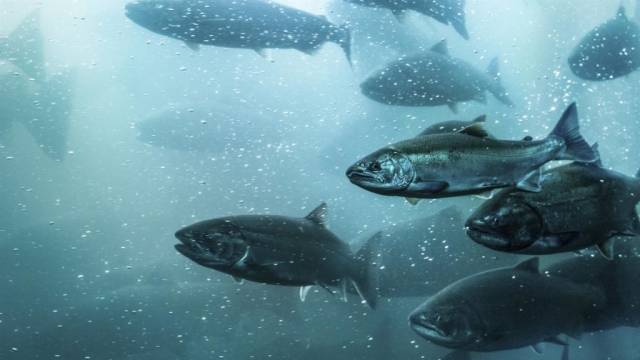
As the global demand for seafood continues to rise, the aquaculture industry stands at a pivotal crossroads. With traditional fishing practices facing sustainability challenges, innovative technologies are becoming essential to ensure the health of our oceans and the efficiency of fish farming. Aquaculture technology is rapidly evolving, bringing forth new methods to boost production while minimizing environmental impact. This transformation not only supports healthier fish stocks but also addresses concerns about food security in an increasingly populated world.
The Rokter emerges as an authoritative hub for aquaculture technology and sustainability insights, providing valuable resources for industry professionals eager to embrace these advancements. With in-depth blog posts and comprehensive industry resources, The Rokter offers a wealth of knowledge that can help aquaculture practitioners navigate the complexities of modern fish farming. Engaging in the dedicated forum further fosters a collaborative environment, enabling professionals to share experiences, explore innovative solutions, and elevate the standards of aquaculture for a more sustainable future.
Innovative Technologies in Aquaculture
Aquaculture is on the brink of a technological transformation as innovative solutions reshape the industry’s practices. Technologies such as automated feeding systems and water quality monitoring sensors are enhancing efficiency in fish farming. These systems utilize artificial intelligence to analyze data, facilitating timely adjustments to feeding schedules and environmental conditions. This not only improves the growth rates of aquatic species but also ensures the sustainability of resources by optimizing feed usage and minimizing waste.
Moreover, the integration of biotechnology into aquaculture is proving to be a game-changer. Genetic advancements enable the breeding of disease-resistant fish, which reduces reliance on antibiotics and other chemical treatments. Additionally, these developments contribute to maintaining biodiversity, as healthier fish populations can thrive without the threat of pathogens. By embracing biotechnological innovations, the aquaculture sector is stepping towards a more resilient and sustainable future.
Another exciting advancement in aquaculture technology involves the use of recirculating aquaculture systems (RAS). These closed-loop systems recycle water and provide a controlled environment for aquatic species, significantly reducing water usage compared to traditional farming methods. RAS not only conserves valuable water resources but also minimizes the impact of aquaculture on nearby ecosystems. As these technologies gain traction, they represent a pivotal shift in how we approach aquaculture, prioritizing both productivity and environmental stewardship.
Sustainability Practices and Their Impact
Sustainability practices in aquaculture are essential for minimizing environmental impact and ensuring the longevity of marine ecosystems. Techniques such as integrated multi-trophic aquaculture utilize diverse species to create balanced systems where waste from one species serves as food for another. This circular approach not only reduces waste but also enhances overall productivity, fostering a more resilient aquaculture environment. Moreover, ongoing research aims to develop more sustainable feed alternatives, further decreasing the pressure on wild fish stocks.
Another significant aspect of sustainable aquaculture is the use of technology to monitor and optimize farming conditions. Innovations such as real-time water quality sensors and automated feeding systems allow for precise management of resources, which can dramatically reduce overuse and waste. By implementing these technologies, aquaculture operations can achieve higher efficiency while promoting environmentally friendly practices. The Rokter serves as an important resource for those looking to adopt these innovative solutions, offering insights and tools that contribute to sustainable growth.
Lastly, engaging local communities in sustainable practices is crucial for the success and acceptance of aquaculture initiatives. Collaboration with local stakeholders can lead to the sharing of knowledge and best practices, fostering a sense of ownership and responsibility for the health of marine ecosystems. Programs that emphasize education and sustainability can empower communities to champion aquaculture practices that are both economically viable and environmentally sound. Through these collective efforts, the aquaculture industry can evolve towards a more sustainable future, benefiting both producers and consumers.
Case Studies: Success Stories in Aquaculture
One notable success story in aquaculture is the use of integrated multi-trophic aquaculture, or IMTA, which combines different species to create a balanced and sustainable farming system. A prime example is in Canada, where farmers have successfully cultivated mussels, seaweed, and finfish together. This approach enhances water quality while increasing overall productivity, allowing farmers to diversify their income streams and reduce reliance on a single species.
In Norway, salmon farming has undergone significant technological advancements that have transformed the industry. Through the implementation of advanced monitoring systems and artificial intelligence, farmers can now track fish health and environmental conditions in real time. This shift has not only improved the efficiency of operations but has also led to better fish welfare and reduced environmental impact, showcasing the potential for technology to create more sustainable aquaculture practices.
Another inspiring case comes from the development of zero-water discharge systems in Asia, particularly in Thailand. By utilizing recirculating aquaculture systems, farmers have reduced water usage and waste output significantly. These systems recycle water while effectively managing the nutrients from fish waste, thereby decreasing environmental pollution. This innovation represents a crucial step towards sustainable aquaculture, aligning with global efforts to conserve vital water resources and minimize ecological footprints.
Challenges Facing the Industry Today
The aquaculture industry faces significant challenges that impact its growth and sustainability. One of the primary concerns is environmental degradation, which includes water pollution and habitat destruction. As fish farms expand, they often lead to nutrient overloads in nearby water bodies, harming local ecosystems. Furthermore, the use of antibiotics and chemicals to manage diseases can result in long-term ecological consequences. Addressing these environmental issues is vital for ensuring the future viability of aquaculture operations.
Another pressing challenge is maintaining fish health and biosecurity. Diseases and parasites pose immense threats to aquaculture productivity. The close confinement of fish in farming systems can lead to rapid disease transmission, resulting in stock losses and economic hardship. Implementing effective management practices and innovative technologies is crucial for enhancing biosecurity and developing disease-resistant fish strains. Collaboration among industry stakeholders is essential to share best practices and create resilient farming systems.
Biosecurity tips for aquaculture
Lastly, economic viability remains a significant hurdle for many aquaculturers. Fluctuating market prices, high operational costs, and competition from wild-caught fisheries can strain profit margins. Farmers are increasingly pressured to adopt advanced technologies that improve efficiency and product quality while managing expenses. Investment in research and development is needed to innovate aquaculture practices that balance profitability with sustainability, ensuring that aquaculture can thrive in a competitive marketplace.
Future Trends in Aquaculture Technology
As the global demand for seafood continues to rise, aquaculture technology is poised to evolve rapidly to meet these challenges. Precision farming techniques are becoming increasingly important, allowing aquaculture professionals to monitor and manage fish health, feeding, and environmental conditions with remarkable accuracy. The integration of IoT devices and sensors is expected to enhance data collection, providing real-time insights that lead to better decision-making and improved yield.
Sustainability is at the forefront of aquaculture innovation, with a growing focus on reducing the environmental impact of fish farming. Emerging technologies such as algae-based feeds and closed-loop systems aim to minimize waste and resource consumption. These advancements not only promote healthier fish stocks but also contribute to the overall health of aquatic ecosystems, making sustainable practices an integral part of the aquaculture industry’s future.
Lastly, the rise of automated systems and robotics is transforming aquaculture operations. Automated feeding systems, underwater drones, and robotic monitoring are expected to streamline farming processes, increase efficiency, and reduce labor costs. These technological advancements will enable farmers to focus more on strategic decision-making while ensuring optimal conditions for fish growth and welfare, ultimately revolutionizing the aquaculture landscape.


